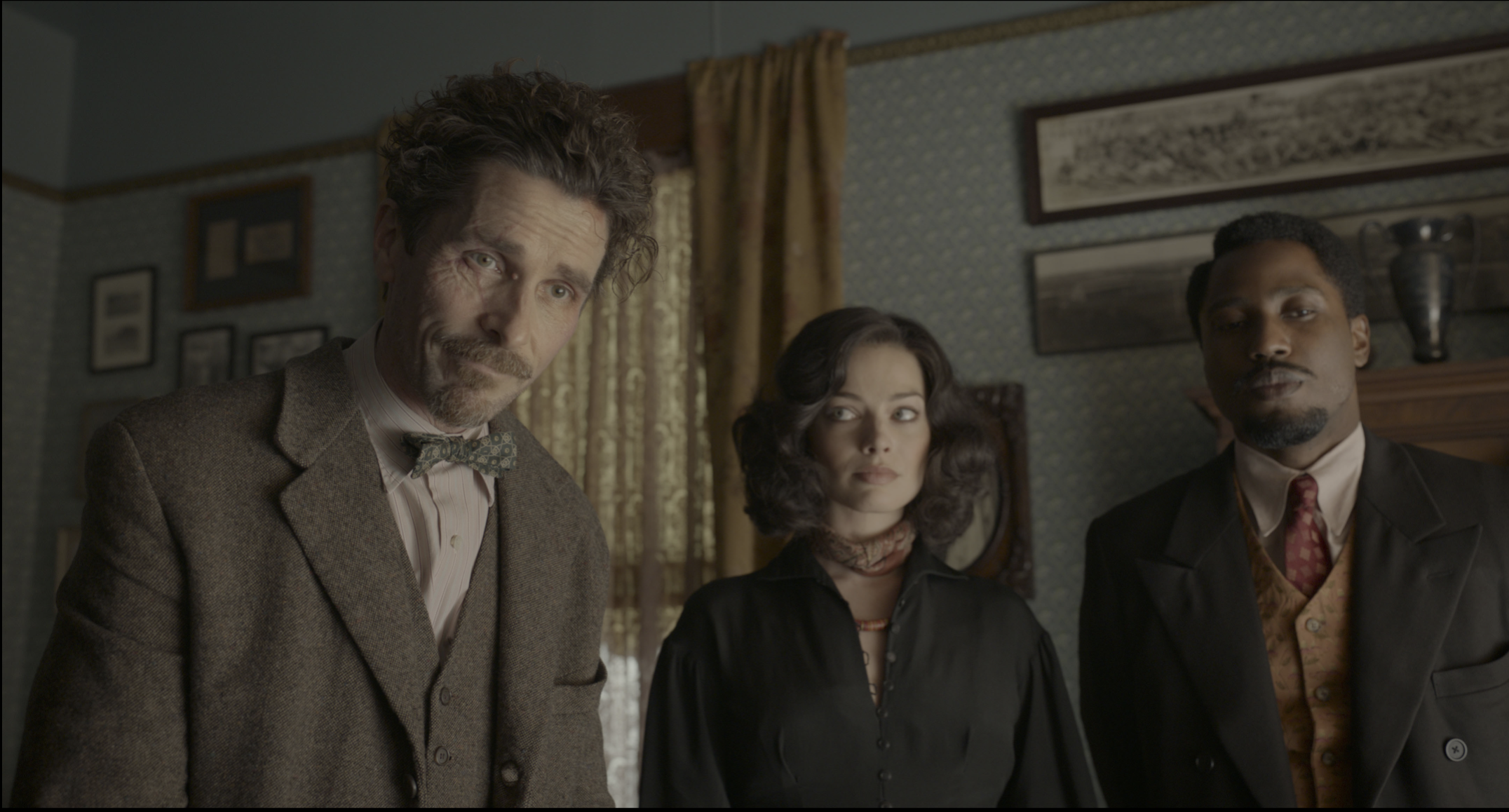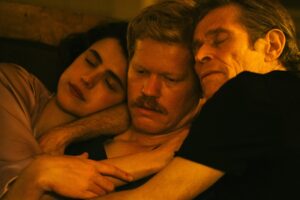Content warning: This article contains reference to sexual abuse
Shocking twists, zany characters, and fast-paced antics: Amsterdam (2022) takes place in 1930s New York City, where three friends find themselves roped into one of the most outrageous plots in American history after witnessing a shocking murder. A vibrant genre-spanning saga, the film attempts to merge the gravitas of a film noir, the intrigue of a murder mystery, and a whimsical tale of unlikely friendship, but ultimately fails to fully encapsulate all of these elements. This ambitious undertaking features a lineup of Hollywood heavyweights; Christian Bale, Margot Robbie, and John David Washington star as the three protagonists at the heart of this film and are supported by Robert de Niro, Rami Malek, Anya-Taylor Joy, and Zoe Saldaña (among others). Plot-wise, Amsterdam is chock-full of glamor and intrigue, yet it lacks a necessary element of depth and cohesion. The film is also unavoidably tainted by the sexual assault allegations against director David O. Russell as well as his inexcusable history of abusive behavior, making it impossible to disentangle the art from the dubious morals of its creator.
One of the biggest draws of Amsterdam is its incredibly impressive cast of celebrated actors; it’s also what keeps you watching. As the story unfolds, one of the most exciting aspects of the experience is wondering who will show up on screen next and what they’ll contribute to the story. It’s undeniable that each of the actors in this film is immensely capable and talented in their own right. However, the odd pairing of these different players means that none of them appear to be truly confident in their tone or consistent with everyone else’s approaches. Unfortunately, these Hollywood veterans therefore come off as amateurish and clumsy.
Of course, this is not entirely the actors’ own fault. It shows that these actors seem to have been thrown together based on their individual talents without fully considering their chemistry with one another. They are entertaining to watch, of course, but they all feel slightly out of place. With perhaps the exception of Christian Bale (Amsterdam marks his third collaboration with director Russell), none of them seem to really take command of the screen, and their insecurity makes it difficult for an audience to become fully immersed in the adventure.
The film’s pace is quite dizzying, jerking along suddenly from one plot point to another. The film doesn’t let itself breathe—it wants to be so much at once, but in the end, it doesn’t end up successfully being any of them. For example: Russell seems to desire the weight of a film-noir drama, but also tries to weave in whimsical, colorful elements reminiscent of Wes Anderson’s quirky comedic style. In his attempt to tie these together, Russell ends up with an odd, disjointed product that leaves the viewer both uninvested in the gravity of the situation, as well as unamused by flat attempts at comedy.
With its lazy use of narration, the film gives off the impression that it doesn’t trust its audience to know what we’ve been seeing. Granted, it moves along with such haste that much of the time the audience really doesn’t get the chance to fully process what’s happened. The movie doesn’t really seem like it even trusts itself. Beautiful cinematography and recognizable faces aren’t enough to distract from the fact that this movie has stretched itself too thin and hasn’t fully met the mark on any of its visions.
While the movie may be entertaining, it isn’t engrossing: its biggest shortcoming is prioritizing style while not having enough substance. Undeniably, the color grading, costuming, set design, and cinematography of Amsterdam are all gorgeous to watch. The film’s soundtrack supports the movie’s shifting tones very well and does a fantastic job of scoring the dynamic of the three central characters. All of these elements effectively place the viewer in the time period at hand, and are probably the most captivating aspect of the movie. It’s unfortunate that a film with the budget to produce such lush visuals and scores was unable to pair these with an equally fleshed-out plotline. Stylistic elements of a film should support the plot and should strengthen the storyline by providing a medium through which to project the film’s message. What they shouldn’t be is a distraction, a diversion tactic to make up for the weaker parts of a film.
Of course, it’s impossible to talk about Amsterdam without discussing the abhorrent history of director Russell, which hangs over an already wobbly film like a dark cloud. Russell has long been an established director and has garnered an impressive amount of acclaim for his prior movies, including American Hustle (2013), Silver Linings Playbook (2012), and The Fighter (2010). However, his career has also been marked by a disturbing history of violence and wildly inappropriate conduct. There’s almost too many examples to lay out all at once, but some instances include allegedly putting Christopher Nolan in a headlock, and Amy Adams’ reports of relentless abuse on the set of American Hustle. On top of all of this is a disgusting instance where Russell was accused of sexually assaulting his transgender niece in 2011, who was just 19 years old at the time. With all of the disturbing accusations against him, it’s astonishing that this director still has enough pull to bring together such a massive project with this impressive cast of actors.
Of course, there are always those who ask: But why is it important to consider Russell’s history? Can’t we just separate the artist from the art, and examine this movie on its own without being influenced by Russell’s prior actions? In the case of Amsterdam, however, the message of the film is so removed from the person Russell has shown himself to be, that the fact he is even daring to preach a message of love and tolerance is frustrating to say the least. At most, it’s infuriating that Russell attempts to hastily wrap up his convoluted story with a rushed moral about the importance of love. He hasn’t made any attempts to show that he’s dedicated to acceptance or kindness in his real life—this failure bleeds into the movie as well, considering he neglected to weave this theme cohesively throughout this film. The theme of love is not embedded within the movie with any nuance or skill, and Russell merely uses it as a convenient copout to put a hurried bow on the tangled plotline he presents.
While the cast and promotional images for Amsterdam appeared incredibly promising, Russell’s weak execution certainly left something to be desired from the film. It feels simultaneously overstuffed and somehow still lacking a key component of nuance and vivaciousness. In attempting to be so many things at once, the final product is aesthetically pleasing but devoid of soul. There are many reasons to be disappointed in Russell, but overall, his hypocritical attempt at preaching tolerance does little to distract from the fact that this overambitious endeavor fell short of his grandiose vision. Though a different director still probably wouldn’t have been able to save the confused tangle that is Amsterdam, Russell’s history has certainly tarnished the film’s intended message with an unsavory insincerity that clouds it like a sinister poison.







